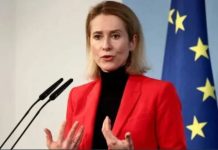COLOMBO, NOV 5 (AFP/APP): When Sri Lanka’s economy collapsed in 2022, politicians and officials were accused of brazenly stealing the island’s assets.
Three years later, the tide appears to be turning against the once-untouchable elite, with several members of the former ruling Rajapaksa family and other powerful figures jailed or appearing in court.
The government is pursuing some of the country’s most powerful individuals — with a former president, several ex-ministers and the heads of the police, prisons and immigration all appearing in court.
Ranga Dissanayake, director-general of the Commission to Investigate Allegations of Bribery or Corruption (CIABOC), was granted sweeping powers in May to recover stolen assets — even without criminal convictions.
There is no official data of state corruption losses, but activists estimate it to be billions of dollars over several decades. Sri Lanka’s GDP per capita income stood at $4,515 in 2024.
“Corruption is the main reason for this economic crisis,” Dissanayake, who took up the post in January, told AFP.
The International Monetary Fund calls for the “prioritising” of anti-graft measures, and says recruitment to CIABOC “should be accelerated”.
– ‘Crossing the Rubicon’ –
Tackling entrenched corruption was a key pledge of leftist President Anura Kumara Dissanayake, who is not related to the CIABOC chief.
“How can a file in the Criminal Investigation Department move up and down, or remain stuck for seven or eight years in a cupboard?” he asked during a speech marking anti-corruption day.
CIABOC faces a backlog of tens of thousands of cases.
“Power is meant to uphold justice,” the president added. “But instead, it is often used for injustice, personal gain and the accumulation of wealth.”
Public anger over crippling shortages of food, fuel, and medicine sparked months of protests in 2022, toppling then-president Gotabaya Rajapaksa.
Gotabaya denies corruption allegations, but the Supreme Court in 2023 said he and his politician brothers “demonstrably contributed to the economic crisis”, and “violated the public trust reposed in them”.
Gotabaya was replaced by Ranil Wickremesinghe, who secured a $2.9 billion IMF bailout to steady the economy.
But Wickremesinghe was arrested in August on charges of using state funds for personal travel.
















